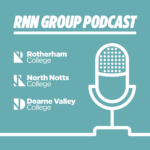Intergenerational Workforces, Power Skills and Succession Planning
Yesterday, a presentation was delivered at the Skills Expo to South Yorkshire’s business community on three topics: Intergenerational Workforces, Power Skills and Succession Planning.
Intergenerational workforces is a big white elephant in the room. No one is addressing what will be a significant issue by 2030, but it goes hand in hand with succession planning which is supported through the development of Power Skills. How – I hear you ask?
Intergenerational Workforces
As the modern workplace continues to evolve, organisations are increasingly faced with the challenge – and opportunity – of managing a multi-generational workforce. Today’s workforce commonly includes four to five generations: Silent Generation / Traditionalists, Baby Boomers, Generation X, Generation Y / Millennials and Generation Z.
Each group brings unique values, work ethics, communication styles, and technological proficiencies. Workforce planning across generations requires thoughtful strategies to align organisational goals with the needs and strengths of each age cohort.
Breaking each generation down
Silent Generation / Traditionalists [1925-1945]
- They were born and raised in a time period where luxury was a rare thing.
- Strong work ethic (most loyal) and they treat work as more important than their personal life.
- This generation is more concerned with achieving their goals. They do not expect any recognition in return.
Baby Boomers [1946-1964]
- Baby boomers are work-oriented over their personal life. But they expect rewards in return although not necessarily financial rewards.
- They don’t feel comfortable working with technology and prefer traditional methods.
- Boomers are considered traditional thinkers and not willing to take risks or think outside the box.
Generation X [1965-1980]
- Gen X is the first generation to have full technological work experience. They contribute to most of the technological advancements.
- Gen Xers are considered independent thinkers.
- The social conditions they grew up with mean they are not willing to stay dedicated to one employer, willingly moving to a new workplace if benefits are better.
Generation Y / Millennials [1981-1996]
- Generation Y is tech-savvy and result oriented. They quickly learn the changing new technologies and would not hesitate to use technology.
- Millennials are family-oriented and admire work-life balance. Money is not the main motive; work-life balance is an expectation, as is making a difference.
- Millennials expect to climb the career ladder as fast as possible. They do not want to feel stagnated in one job role. Cultural fit, values and purpose are crucial.
Generation Z [1997-2012]
- Generation Z is seeking constant attention. They always expect their superiors to admire their work.
- They use new technologies for innovative methods to re-engineer processes with better and faster outcomes.
- Work-life balance is a key expectation and they always want to stay connected with friends / family – work is merely a way of funding their lifestyle.
The new Generation – Generation Alpha [2013- ]
- Generation Alpha are the children of Millennials. Tech is developing rapidly and Gen Alpha is expected to be a part of this new development.
- Gen Alpha is an independent generation. They want to work independently (no rules!) and to make autonomous decisions.
- Gen Alpha is interested in environmental and healthy purchases; they are considered a worry-free generation and live life in the moment.
What strategies can you implement to support your business?
Fostering a culture of inclusivity and respect
Employers must recognise and appreciate generational differences without bias. Providing training in generational awareness can help reduce misunderstandings and foster better collaboration.
Leaders who promote mutual respect and leverage diverse perspectives enhance innovation and cohesion across age groups.
Customising communication and engagement tactics
While Baby Boomers may prefer face-to-face meetings or emails, younger employees might favour instant messaging and collaborative platforms like Slack or Microsoft Teams.
Tailoring communication methods helps ensure clarity and connection. Additionally, recognising preferred feedback styles -structured annual reviews for some, real-time feedback for others – can greatly improve performance and satisfaction.
Flexible work arrangements and development opportunities
Younger generations often seek career development and work-life balance, while older employees might value job security and meaningful roles as well as roles offering time off for caring responsibilities. Offering options such as remote work, mentorship programmes, phased retirement, or upskilling initiatives ensures employees at every life stage feel valued and supported keeping Boomers in for a little while longer to prevent the ‘cliff-edge’ effect in 2030.
Ultimately, successful workforce planning across generations demands an adaptive, people-centred approach. Organisations that invest in understanding and integrating the unique attributes of each generation are better positioned to build resilient, high-performing teams for the future.
Power Skills
In today’s fast-changing and interconnected world, technical expertise alone is no longer sufficient for driving business success. The term “power skills”– often used interchangeably with soft skills or transferable skills – represents a category of interpersonal and cognitive abilities that are increasingly seen as essential in the workplace. These include communication, emotional intelligence, adaptability, problem-solving, collaboration, and critical thinking. Unlike technical skills that may become obsolete, power skills are enduring and versatile across roles, industries, and technologies.
37% of Gen Z worry that technology weakens their ability to maintain strong interpersonal relationships and develop people skills.
RNN Group is pioneering a new activity called Skills for Employment which is working to address this issue. We are not only promoting the key skills of communication, decision making, team work, leadership skills, critical thinking, creativity, problem solving, being proactive, being on time, being reliable and, resilience building, but we are also advising students about the use of Linked In in their career development and using email – a core tool for most businesses.
In essence, power skills are no longer “nice to have” but a strategic imperative.
For businesses, embracing power skills means equipping their workforce to be more resilient, innovative, and human-centred.
Investing in power skills training also enhances a company’s adaptability and customer orientation and supports Gen Zs need to develop this area they know they are lacking in.
Moreover, power skills contribute significantly to employee engagement and leadership development.
Succession Planning
With all baby boomers on the cusp of retirement – or on the ‘cliff edge’ as it is being called by businesses – with all boomers reaching the age of 65 in 2030 after years of developing vast amounts of knowledge and experience in all industries and organisations, and Gen Z needing gen up on their people skills, there has never been a more crucial time to succession plan.
Succession planning is the strategic process of identifying and developing internal talent to fill key leadership and critical roles within an organisation when they become vacant. For businesses, this is not just about preparing for retirement or sudden departures – it’s about ensuring continuity, stability, and long-term success.
So why does this matter for business?
- Business Continuity: A robust succession plan minimises disruption when key personnel leave, whether due to retirement, resignation, or unforeseen events. This helps preserve institutional knowledge and operational momentum.
- Talent Retention and Engagement: Employees are more likely to stay and perform at their best when they see clear pathways for growth. Succession planning demonstrates a company’s commitment to career development.
- Leadership Development: By identifying future leaders early, organisations can tailor development opportunities, mentorship, and training (available locally) that prepare them for higher responsibility.
- Risk Management: Without a succession plan, organisations risk falling into leadership vacuums or misalignment of roles that can impact productivity, culture, and strategic direction.
What Strategies can you Implement to Support your Business Growth?
Identify Critical Roles
Begin by pinpointing the positions that are vital to business operations and strategic objectives – not just at the executive level, but also in roles where specialised knowledge or leadership is crucial.
Assess and Develop Talent
Use performance reviews, 360-degree feedback, and potential assessments to identify high-potential employees. Create personalised development plans including coaching, job rotations, stretch assignments, and leadership training.
Create Talent Pipelines
Establish a structured process to cultivate internal candidates over time. This may involve tiered succession pools (short-term and long-term readiness) and clear benchmarks for progression.
Encourage Knowledge Transfer
Pair seasoned employees with emerging talent through mentoring or job shadowing. This facilitates the transfer of institutional knowledge, soft skills, and organisational culture.
Integrate with Broader Workforce Planning
Succession planning should align with organisational goals, diversity and inclusion initiatives, and future workforce needs. It should be a continuous, dynamic process rather than a one-time event.
Communicate Transparently
While not all succession details need to be public, being open about development opportunities and leadership expectations can boost morale and clarity.
For businesses wanting more information or help and support with succession planning specifically about courses to support this, or to find out more about skills for employment, email lucy.barnwell@rnngroup.ac.uk.












